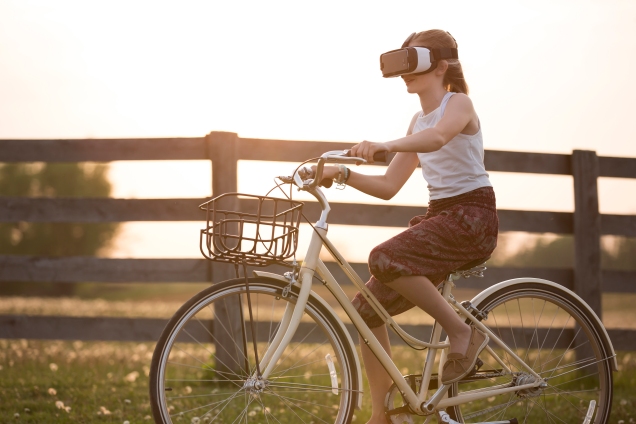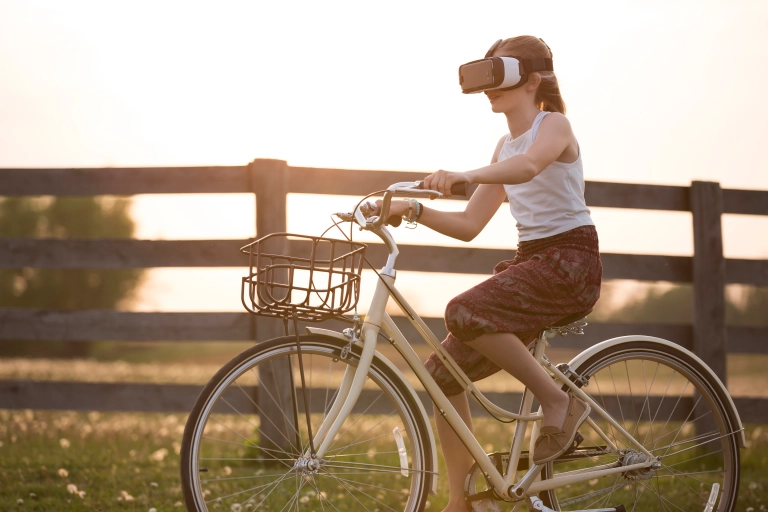
Progress is always knocking on the door. However, there has been a particular technology that we left “standing” affront of that same door for the past nearly thirty years (at least in the form we know nowadays).[1] Virtual Reality is not new, but more and more new applications of it are presented to us literally with the speed of the light. In order of this article to be concise, we will concentrate only on the VR’s impact on sports but should be noted the huge influence the technology has in medicine, media, marketing and many other spheres of our lives. [2]
One is for sure – the sports industry will change. VR has already being used in a new training technique which allows athletes to practice without suffering any impacts, thus preventing the risk of injuries.[3] One can only imagine how beneficial this will be in creating new-age athletes, with longer professional “longevity” and “faster” brains. This is exciting.
On another note, looks like the big winner of the development of the VR will be the fan. The new technology is so promising regarding the sports broadcasting that one can nearly see his childhood dreams of being on the first row of his favorite team’s games coming true. [4] We are yet to see how this will change our sports culture and the business itself. The stir aside, we must admit that as every new tool, the VR also possesses both positive and negative sides.
Get Ready to Share – A Lot
Like every new technology, the VR brings a lot of new and unprecedented risks. On the legal point of view, it seems that issues concerning users’ safety and privacy will come into light.
Some may debate that regarding privacy, the modern-day user is already sharing voluntarily significant parts of his personal data. However, VR threatens to take this sharing to a whole another level. Are you ready to provide access to your physical movements? What about to the brain waves you emit? Scary, isn’t it?
Imagine now, all this information being available to hackers, advertisers, and government agencies. This will take personal profiling to a whole another level for which most probably the society is not ready yet. When collecting data, the VR companies must be straightforward in their privacy policies or other public-facing documents. Moreover, the safeguarding of the cumulated data must be adequate and sufficient. After all, protecting users’ privacy is not a new challenge – we have been granting personal data to financial institutions, dating and entertainment websites, social media and so on, just with VR the level is getting higher as the information is getting more and more private.
What is Privacy?
However, before we start dissecting the problem, what does privacy mean? The answer can be different, according to the context, yet one thing is sure – the right of privacy is a fundamental human right. In some countries, data protection and privacy merge into one, and that is the case of China too.
The Right of Privacy is stipulated in almost every country’s Constitution or can be found in the provisions of other Laws (as it is in the U.S. and India, for example), and moreover, in many countries, international agreements that recognize the right of privacy have been adopted into Law.[5]
In the past years, many countries are upholding or on their way of upholding comprehensive privacy laws. In China’s case, this is to secure the rights of the consumer and strengthen the e-commerce. However, the technology has always been developing way faster than the legal systems. Now, more than ever, the interference with the Right of Privacy requires the law to “step-up” and to not allow the existence of blank spaces and gray areas. Another point to be considered is, even if there is legislation to be implemented to the newly occurred issues, is there any authority which can enforce it?
VR and China
It is a well-known fact that some websites and social platforms have been banned in China for quite some time now. Thus, we should ask ourselves, how will some of the providers of the VR technology work in the Mainland? [6] For example, Oculus, one of the main players on the market, has been acquired by Facebook and therefore is sending information to Facebooks’ servers. In the privacy policy of the company is stated that not only collects information voluntarily provided by its users but also automatically collects certain information when the consumer uses its services.[7] This “certain” information includes data about users’ physical movements and dimensions when one is using the VR headset.
We are about to see how this company and some others intend to approach the Chinese market and if for the sake of the sports development and popularization China will be willing to change its policies. For now, we can concentrate on discussing the current legal framework that might be applied to VR in regard to the Right of Customers Privacy.
Privacy Rights under Chinese Law
In China’s case, the Right of Privacy is enshrined in the Constitution, and it is in direct connection with the Right to Dignity. There is no general privacy and data protection regulation, but many specific sectorial laws are governing different areas so we can talk about “cumulative effect” of the legal instruments. The same model of privacy protection is used in the United States. The main argument against this approach of regulation is that because the norms are spread in many legal acts, there is a lack of generic information concerning the issue. However, Chinese individuals have been granted protection by the courts on the basis of a violation of their Right of Privacy.
As it was already mentioned, in China data protection is also included in the broader meaning of Right of Privacy. In the recent years, many laws and regulations have been adopted in that area. We can find the definition of “personal data” – any electronic information which can enable you to identify citizens’ identity and which relates to personal privacy. The main issue until today is the lack of one centralized enforcement mechanism for data protection.
Let’s take a closer look at the primary Laws and Regulations concerning the Privacy Rights.
The freedom of expression, the personal dignity of citizens and the freedom and privacy of the correspondence are recognized and protected by The Constitution of People’s Republic of China under Articles 35, 38 and 40 respectively.[8] The General Principles of Civil Law provides a “right of reputation” to citizens and corporations, and an unauthorized revelation of the privacy of others constitutes an infringement upon the right of reputation.[9] Another law of importance for the privacy protection is the Tort Liability Law enacted in 2009. Article 2 of this law enables citizens to sue for damages for violation of their privacy. The Criminal Law also prohibits the sale or illegal provision of or illegal access to citizens’ personal information.
Another act that has the same effect as a law and aims to protect the “electronic information” is The Decision on Strengthening Online Information Protection adopted by the Standing Committee of the National People’s Congress. [10] The Decision regulates all of the “internet service providers and other enterprises and institutions that collect or use citizens’ personal electronic information in the course of their business”. These “shall abide by the principles of legality, legitimacy and necessity, clearly indicate the objective, methods and scope of collection and use of information, and obtain agreement from the person whose data is collected, they may not violate the provisions of laws and regulations, and the agreement between both sides, in collecting or using information”.
Article 50 of the Law on the Protection of Consumer Rights and Interests states that “proprietors, who harm consumers’ human dignity, infringe upon consumers’ personal freedom or upon consumers’ lawful right to protect personal information, shall cease infringement, restore consumers’ reputation, eliminate the impact, make formal apologies, and compensate consumers for losses”. [11]
Another legal act worth mentioning is the brand new Cybersecurity Law which is the gem in the crown of China’s IT protection laws. [12] For now, the scope of it doesn’t include VR technology however as both the law and technology are recent, we are yet to see how and if they will collide.
Taking everything into account, a larger part of the previously mentioned acts stipulate that associations can gather and utilize individual data just if the accompanying conditions have been met:
- Abide by the standards of lawfulness, authenticity, and necessity;
- Explicitly advise the reasons, means and extent of gathering, utilize and divulgence of individual data;
- Obtain the subject’s consent to the individual data gathering, use, and divulgence;
- Not disregard laws, regulations or assertions between the organization and the data subject when gathering or utilizing the personal data;
- Make freely accessible the association’s principles in regards to gathering and utilization of individual data.
Where Does All That Leave Us?
As we can see, in China, as everywhere else in the world, the legislation is just partially ready for what is coming and for all the legal issues the VR technology will bring. However, as one of the fastest growing economies and a very, very smart businessman, China will most probably adapt way faster to the new situation that everyone thinks. Let’s keep in mind the change in the sports policy in the country after the Beijing 2008 Olympics and also not forget that there are two big sports forums to be hosted by the country in the following years – FIBA’s World Basketball Cup in 2019 and the Winter Olympics in Beijing in 2022.[13]
One is for sure – China knows all eyes will be turned toward it, and will provide them with some worthwhile entertainment. Why not VR related?
[1] For more detailed information on the VR’s history, please check https://www.vrs.org.uk/virtual-reality/history.html .
[2] How VR is changing the healthcare http://medicalfuturist.com/5-ways-medical-vr-is-changing-healthcare/ .
[3] EON Sports, Sports Training and Virtual Reality: Challenges in making the physical, virtual; and Nick Bannon, Changing the game with VR sports training, 2017.
[4] NBA already started broadcasting games in VR. https://watch.nba.com/page/vr
[5] For example, the European Convention on Human Rights or the International Covenant on Civil and Political Rights.
[6] As a special administrative region, the rules do not apply for Hong Kong.
[7] For reference see Oculus’s Privacy Policy https://www.oculus.com/legal/privacy-policy/ .
[8] http://www.npc.gov.cn/englishnpc/Constitution/node_2825.htm
[9] Article 101 of the Civil Law. See also Juridical Interpretations of the Civil Law (1988).
[10] The protection in some cases goes beyond the Internet.
[11] Article 56 of the same Law stipulates a monetary fine when “the human dignity or personal freedom of consumers is infringed or consumers’ lawful right to protection of their personal information is infringed”.
Worth mentioning is also the Measures on Penalties for Infringing upon the Rights and Interests of Consumers promulgated in January 2015.
[12] http://www.cnbc.com/2017/05/31/chinas-new-cybersecurity-law-takes-effect-today.html
[13] http://www.playthegame.org/uploads/media/Xiong_Huan_-_The_changing_of_the_Chinese_Government_s_Sports_policy_Post-Beijing_2008.pdf




